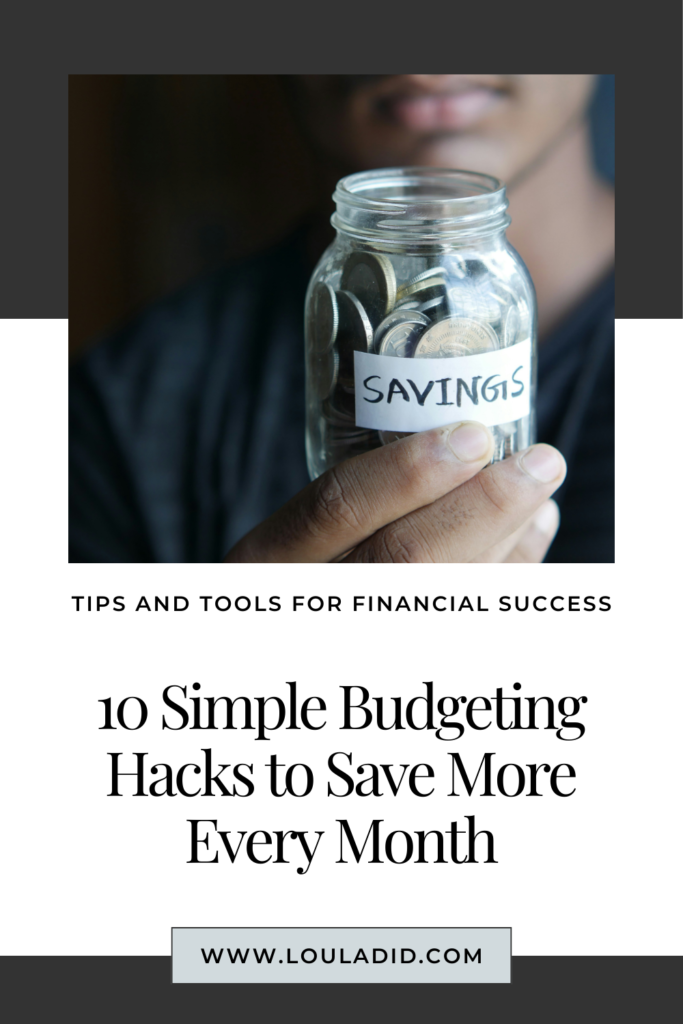Budgeting doesn’t have to be about cutting back on everything you enjoy. In fact, a good budget should feel like a tool to help you take control of your money—not a punishment. Whether you’re saving for a big purchase, building an emergency fund, or just trying to stretch your income further, these 10 simple budgeting hacks will help you save more every month without sacrificing too much.
If you’ve ever felt overwhelmed by finances or struggled to stick to a budget, don’t worry—you’re not alone. These budgeting hacks are designed to be practical, easy to implement, and, most importantly, effective. Ready to take the stress out of saving? Let’s dive in.

1. Track Your Spending
The first step to saving more is knowing where your money is going. Start by tracking all your expenses for a month. Use a budget template or simply jot it down in a notebook.
You might be surprised at how small, everyday purchases—like takeaway coffees or subscription services—add up. Once you see where your money is going, it’s easier to identify areas where you can cut back.
2. Set a Realistic Budget
Creating a budget doesn’t mean saying no to everything fun. Instead, set realistic spending limits for different categories like groceries, entertainment, and transportation. The 50/30/20 rule is a great starting point:
- 50% of your income goes to essentials (rent, bills, groceries).
- 30% is for wants (eating out, subscriptions, hobbies).
- 20% goes to savings or paying down debt.
Adjust the percentages to fit your situation, but make sure saving is always part of the plan. You can use budget planning templates to help with this – Here’s link to a simple template you can download https://louladigital.etsy.com/
3. Automate Your Savings
One of the easiest ways to save is to pay yourself first. Set up a standing order to transfer a portion of your income into a separate savings account as soon as you get paid.
This “out of sight, out of mind” approach ensures you save consistently without the temptation to spend the money first. Many UK banks, like Monzo or Starling, offer features to automate savings and even round up your purchases to save spare change.
4. Plan Your Meals
Meal planning is a game-changer when it comes to saving money. By planning your meals for the week, you can reduce food waste and avoid expensive takeaways or last-minute grocery runs.
Create a shopping list before heading to the supermarket and stick to it. Better yet, try online grocery shopping to avoid impulse buys. You’ll be amazed at how much you can save with just a little preparation.
5. Cancel Unused Subscriptions
How many subscription services are you actually using? Take a look at your bank statements and identify subscriptions you don’t need anymore.
Whether it’s a streaming service, a gym membership you rarely use, or a forgotten magazine subscription, cancelling these can free up extra cash each month. Use services like Trim or check your banking app to spot recurring payments you might have missed.
6. Use Cashback Apps
Cashback apps are an easy way to earn money on purchases you’re already making. Apps like TopCashback or Quidco offer cashback when you shop at participating retailers.
If you’re shopping online, installing a browser extension can automatically alert you to cashback opportunities. Over time, these small savings can add up to significant amounts.
7. Switch Providers
When was the last time you reviewed your utility bills, insurance, or mobile plan? Loyalty doesn’t always pay when it comes to service providers. Use comparison sites like MoneySuperMarket or Compare the Market to find better deals on everything from car insurance to broadband.
A quick phone call to your current provider can also result in discounts—many companies will lower your bill if you mention you’re considering switching.
8. Embrace the 24-Hour Rule
Impulse purchases can quickly blow your budget. To avoid buyer’s remorse, adopt the 24-hour rule: if you see something you want to buy, wait 24 hours before making the purchase.
This cooling-off period gives you time to decide if it’s something you really need or just an impulse. Nine times out of ten, you’ll find the urge has passed, and you’ve saved yourself some money.
9. Set Clear Savings Goals
Having a clear goal makes saving money more motivating. Whether it’s a holiday, a new car, or a down payment on a house, knowing what you’re saving for can help you stay on track.
Break your goal into smaller, manageable chunks. For example, if you’re saving £1,200 for a holiday, aim to save £100 a month for a year. Seeing your progress each month will keep you motivated.
10. Make Use of Free Activities
Entertainment doesn’t have to cost a fortune. Look for free or low-cost activities in your local area, like visiting museums, attending community events, or exploring parks and nature trails.
You can also take advantage of free resources like local libraries for books, movies, and even workshops. Reducing how much you spend on entertainment doesn’t mean you have to sacrifice fun—it just requires a little creativity.

Why These Hacks Work
These budgeting hacks work because they’re simple and adaptable to your lifestyle. By tracking your spending, setting realistic budgets, and automating your savings, you’re building habits that make saving second nature. Small changes like meal planning, cashback apps, and the 24-hour rule may not seem like much individually, but together, they can make a big impact on your monthly savings.
Putting It All Together
Saving money doesn’t have to be overwhelming or restrictive. Start by trying one or two of these budgeting hacks, then gradually incorporate more as you get comfortable. The key is consistency—small steps taken regularly can lead to significant financial progress over time.
Remember, the goal of budgeting isn’t to deprive yourself but to empower you to spend on what truly matters. With these 10 hacks, you’ll be on your way to saving more each month and building a more secure financial future.
Ready to take control of your budget? Start today, and watch those savings grow!
